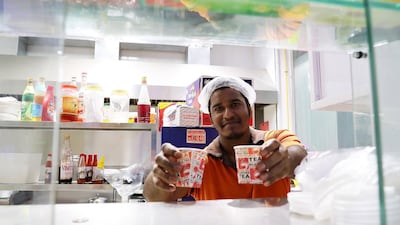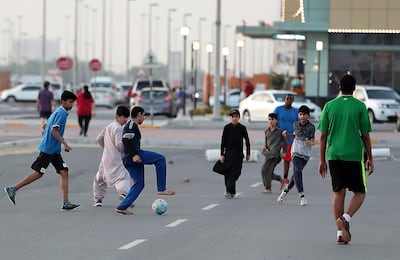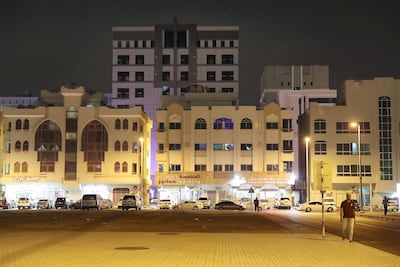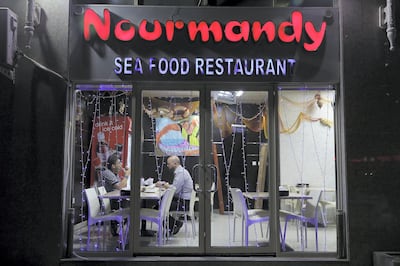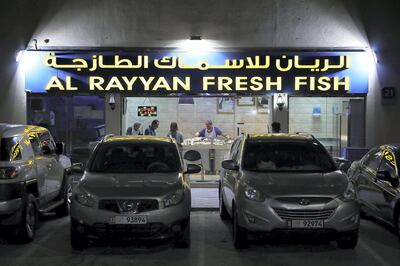There is a suburb of Abu Dhabi where you can travel the world.
According to the Abu Dhabi Film Commission, Mussaffah can double as a location for Bahrain, Oman, Kuwait and even parts of war-torn Iraq and Afghanistan.
This may not be hugely surprising. Mussaffah developed as an industrial complex from the 1970s as the discovery of oil transformed the city. It swiftly became known for its gritty mix of shabby warehouses, labour camps and car workshops. But the suburb is now home to Dalma Mall, the emirate’s second-largest after Yas Mall, schools are opening, restaurants are appearing and a hotel will welcome its first guests by December. Abu Dhabi Municipality has installed new street lights, demolished buildings, removed abandoned cars and the air of unruliness that once pervaded the area is fading away.
Mussaffah is divided by the E30 motorway. On one side, by the port, is the industrial area while on the other side is the residential area of Mussaffah Shabiya.
When we visit the industrial part one Sunday evening, crowds of people are attending St Paul’s Catholic Church for mass. At least 10,000 people attend services here every week and music from the choir drifts into the street and into the nearby labour accommodation.
There are also Armenian and Greek churches, while a huge Anglican church is being built nearby. Reverend Andy Thompson is the chaplain at St Andrew's Church in Abu Dhabi city. It can no longer cope with demand and this new centre of worship will cater for the expanding Christian community.
“It’s changing in front of our eyes,” said Rev Thompson, who arrived in the UAE eight years ago. “The area has been cleaned up massively.”
Many who live in Mussaffah are domestic and industrial workers, do not make a lot of money and can’t afford to travel into the city to attend services. The church aims to change that.
“I’ve met people from Africa and India who are Christian and say: ‘You don’t see me in church because it’s difficult for me to get there from Mussaffah’,” said Rev Thompson.
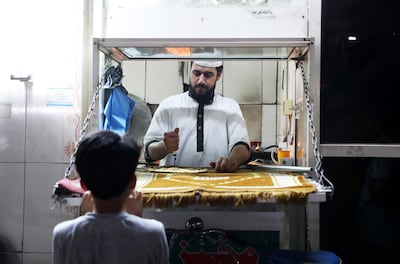
Across the E30 is Mussaffah Shabiya, hugging the motorway down a long strip. Official population figures for Mussaffah are not public but most people live in this part and here, too, changes are in the air. People are drawn to the competitive rents with one-bedroom apartments now available for Dh40,000. A trail of 4x4s wait for service outside funky restaurant Burger28, schools have relocated to the area and construction sites abound.
At Ghulam Manual Bakery, Reham Ulla is manning the oven. Mr Ulla, from Afghanistan, sells about 400 naan a day and works beside the gas-fired oven despite the searing summer heat. “What am I to do?” he says, as the sweat pours off his brow. “In winter it’s no problem, but summer is too hot and difficult.”
A steady stream of customers line up for the bread despite some of these older bakeries falling out of favour. Down the street is Nourmandy restaurant. Mohammed Hassan opened the seafood eatery four years ago and says business has increased over the past few years.
“It’s like a small town and here we have everything,” said Mr Hassan, who is from Egypt. “New customers are always coming in.”
In a nearby block, the final touches are being applied to the 73-room Gravity Hotel. It’s the first in the area and its new manager Youssef Riachy says the facility is sorely needed because of the influx of schools, the presence of Al Ain University and the forthcoming Burjeel Hospital.
“We are targeting the corporates,” he said. “There will be many engineers, doctors and students coming here. Now they will have options.”
The area is home to a multinational community — Indians, Egyptians, Pakistanis, Jordanians walk from the bakeries to the laundries, baqalas and vegetable shops. People play cricket and volleyball in the car parks.
Shazad Akram, from Lahore, Pakistan, lives in the area and has stopped for a karak at one of the many small cafeterias. “Before, there were no malls or markets,” said Mr Akram, 29. “I prefer here to the city because there it’s hard to park. We also have good security.”
Mussaffah Shabiya is also punctuated by several small fishmongers. You don’t find many of these standalone fish shops in Abu Dhabi anymore with most swallowed by supermarkets and large markets.
Al Rayyan Fresh Fish opened last year and is one of at least four in the area. Al Rayyan gets its fish from the market at Mina Zayed in Abu Dhabi, and Dubai and also supplies restaurants.
Staff and customers say the price, service and freshness of the fish is why they prefer the smaller shops. “The city has the fish market at Mina Zayed but it would take people here 40 minutes to reach there,” said the shop’s manager, Abdul Majeed, who is from Syria. “There are a lot of fish shops here.”
From the counter, Mr Majeed points out at the construction of residential blocks taking place around the shop.
“We are now waiting for the customers.”
_______________
Read more:
Free bus service that can be hailed on the street on trial in Abu Dhabi suburb
'Every one of us is a little lost': Demolition starts on Umm Al Quwain's decrepit old town
How Mussaffah is undergoing a quiet transformation
Mussaffah residents demand more public services and facilities
_______________
